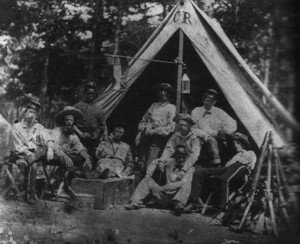An anonymous Baptist from Savannah, Georgia, pens a letter today that, when it is published in Baptist newspapers in the coming weeks, will shock and dismay many home front Southern Baptists. Something evil, in short, pervades the Southern Zion.
An eminent divine of this city, just returned from Manassas, represents that place as wholly given up to wickedness; and says that the number of apostacies, when this war closes, will astonish and mortify good men everywhere. As at Manassas, so among the soldiers generally elsewhere. Those who go into camp without firmly established moral principles, in fact, without a heart full of vital godliness, rarely escape being plunged into the vices that surround them, while many a professing christian finds the fiery ordeal too trying for his weak faith, or want of faith.
While this is the case, and we stand appalled at the daily growing sinfulness of the army, the subject is made still more gloomy because christian people seem not to know how to check this flood of iniquity, and how best to labor for the spiritual welfare of the soldier. One difficulty to meet is the careless manner in which too many of those in high places treat religion….
Manassas is significant to the South because the previous July the Confederates had routed Union forces in the first — and thus far only — major battle of the war. Even upon this sacred battleground, yet held by Confederate forces, wickedness among southern soldiers is overwhelming.
The writer suggests that Baptists need to redouble efforts to put New Testaments in soldiers’ hands. Indeed, throughout the remainder of the war Southern Baptists, lamenting the sins of soldiers, work hard and tirelessly to distribute bibles and other Christian literature among the defenders of the Confederacy. Nonetheless, the problem of pervasive evil in the camps remains until the war’s end.
Source: “Southern Correspondence,” Biblical Recorder, February 5, 1862 (link)



